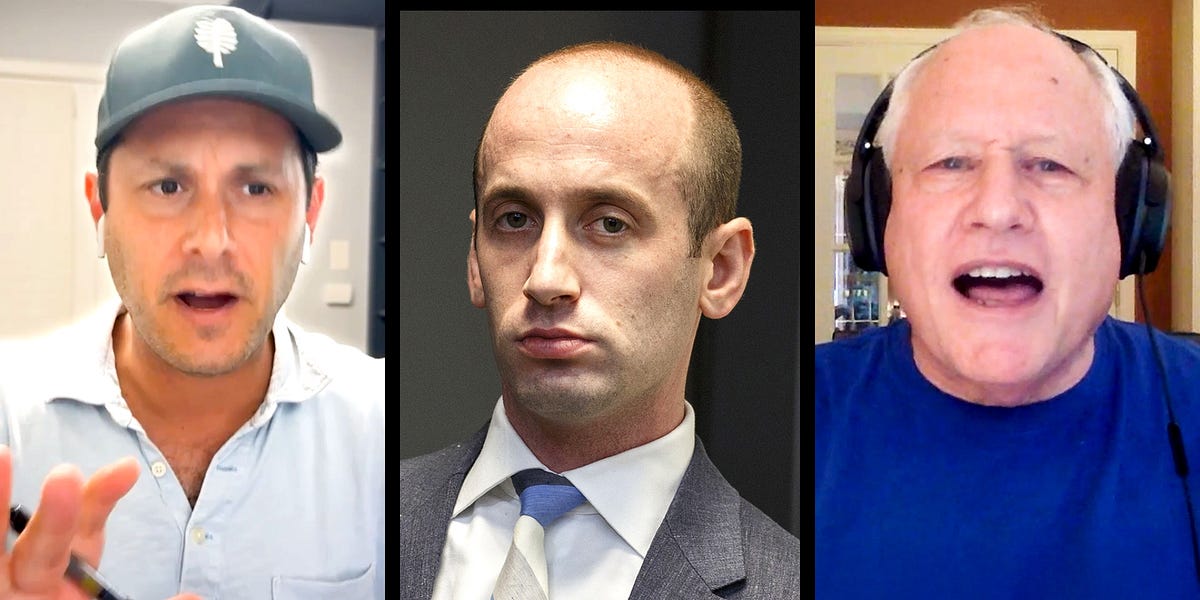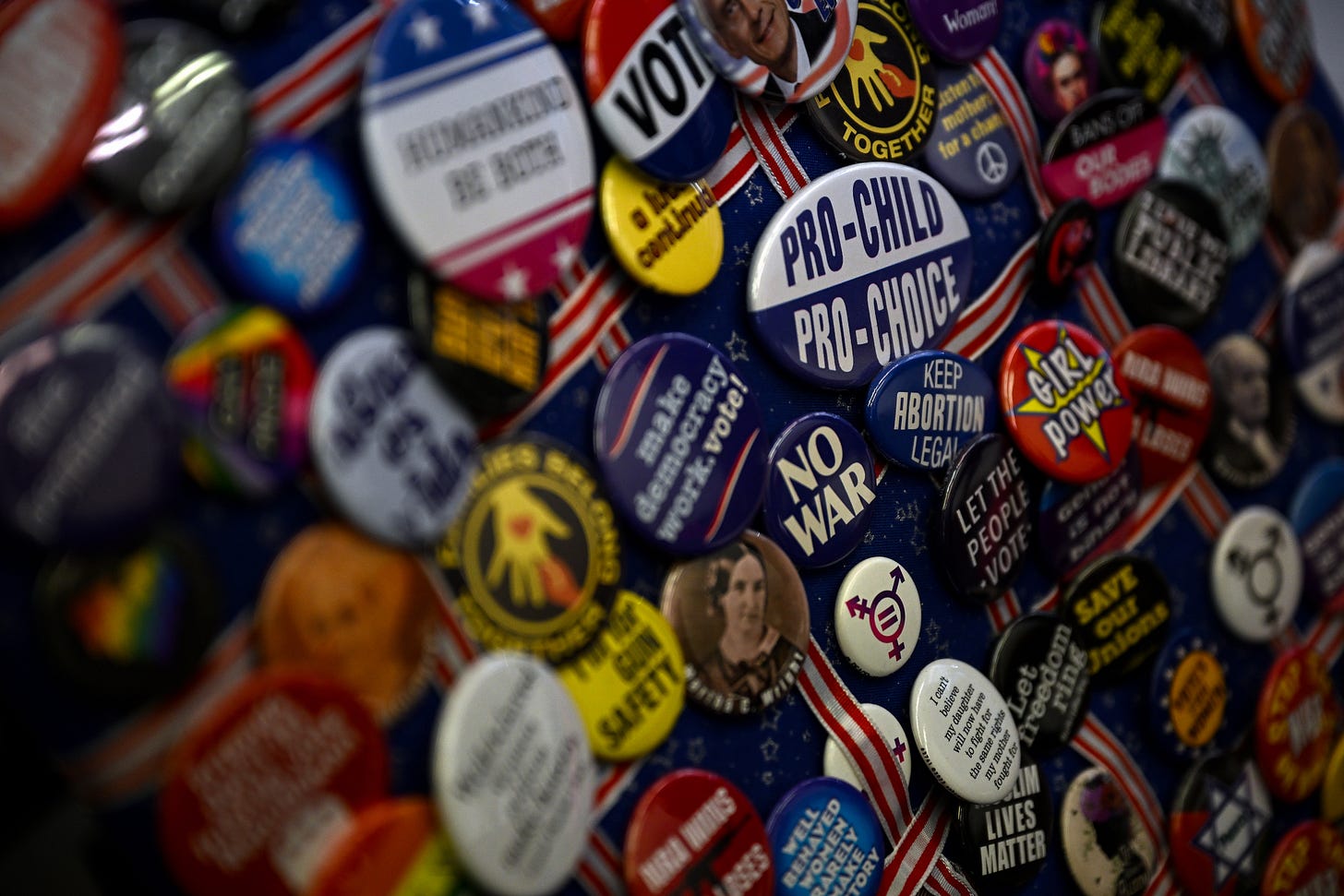
Trump Wants Riots To Unleash His Authoritarian Playbook
June 8, 2025
The Crisis They Wanted
June 8, 2025IN THE BASEMENT OF THE HAMILTON HOTEL in downtown Washington, D.C. this week, a few hundred moderate Democrats gathered to discuss the party’s path forward and to commiserate over a common enemy: “the groups.”
Over the course of five hours, this many-headed bogeyman made multiple appearances at the conference, known as WelcomeFest. Rep. Jared Golden of Maine criticized the activist group Indivisible for pushing Democrats to take unpopular positions. Third Way’s Lanae Erickson argued that grassroots organizations such as Justice Democrats and Our Revolution had been “damaging” to the national Democratic brand. Center-left substacker Matthew Yglesias lamented that President Joe Biden was never able to come up with a plan to fight crime because he got tripped up trying to please criminal justice reform groups.
Gripes like these are almost trite at this juncture. Since the election, “the groups”—a catchall term for the nonprofits and advocacy organizations dedicated to advancing issues like more lenient asylum policy or stricter gun control—have become the go-to explanation for Democratic leaders looking to understand why they lost ground with voters in nearly every single county in the country.
And yet there is something unsatisfying, if not a bit convenient, in the explanation. It’s a bit too pat—after all, the politicians themselves have agency. As the party looks to make up lost ground, the focus will invariably have to shift from blaming “the groups” to challenging the candidates and elected officials to follow their own political instincts and tell advocates “no” when appropriate.
Signs that the party is beginning to grapple with this necessity are starting to appear. Elsewhere at WelcomeFest, Adam Jentleson, the former chief of staff to Pennsylvania Sen. John Fetterman, said that getting yelled at online should be considered a signal of political virtue. Yglesias, at one point, showed a slide that read: “You are going to get yelled at.”
Other Democrats, in more hushed tones, have been pushing the party to grow thicker skin. They want members to eschew the classic consultant-driven model of politics, in which every media foray is examined through the prism of what risks it brings and an elite class of college-educated people are tasked with explaining how best to reach the voting masses.
But the party still has a long way to go. In an interview with The Bulwark, former Montana Sen. Jon Tester, who lost his re-election bid in 2024, described his fellow Democrats as almost a hermetically sealed species. He said the party was influenced on issues such as immigration by people who “didn’t get outside the walls of Washington.” More dramatically, he said that efforts to try and change direction were fought on the grounds that Jentleson outlined: a desire not to offend.
“I can’t tell you how many times when I was in the Senate during the caucus, people would stand up and say, ‘So who are we pleasing with this policy?’ And it was the so-called groups,” Tester said. “We got to quit listening to the fucking groups because those groups are taking us down rabbit holes that make us unelectable.”
“We didn’t say ‘no,’ let’s just put it that way,” he added.
EVERY POLITICIAN SPENDS TIME catering to interest groups and voting blocs in hopes of winning their support. Even Donald Trump, widely seen as one of the more trusts-his-guts pols in recent memory, spent the 2016 campaign making promises to classic conservative constituencies (from the NRA to the Federalist Society to the pro-life crowd) in hopes of earning their trust—and their backing.
But success in politics doesn’t always relate to how skillfully those groups are courted. Often, in fact, a politician can get along just fine by making a show of independence from them. During his third run for the presidency, Trump dutifully declined to say he’d support a strict abortion ban, knowing fully well that it could tie his hands in the general election.
Signaling that you’re independent or above groveling has worked for Democrats, too. Barack Obama, in 2008, attacked two then-opponents—Hillary Clinton and John McCain—for cynically calling for a gas-tax holiday as prices at the pump spiked that summer. And in 2019, Joe Biden refused to fill out a now-infamous 2019 ACLU questionnaire that pushed Democratic candidates for president to commit to providing gender-affirming surgeries for those in prison, including undocumented immigrants.
Kamala Harris did answer that questionnaire, and five years later her responses became the basis of an attack ad against her in her 2024 campaign. The blame for this incident has been directed not only at Harris for answering the way she did but also at the ACLU for issuing the questionnaire. Since the election, officials at some of the biggest left-leaning groups have been reflecting on whether litmus tests end up harming their candidates. Some advocates acknowledged to The Bulwark that certain groups, particularly Latino organizations, inflated their analysis of what voters wanted on issues like immigration. And there is now a widespread expectation that in the coming cycles, questionnaires largely won’t be issued—in part because candidates will refuse to answer them.
But while most people would be fine with that resolution, not everyone thinks that’s the right diagnosis. After all, the job of the interest group is to influence lawmakers. It’s up to the lawmaker to decide how to respond.
“The groups are doing the amount of influencing that the politicians are allowing them to do,” said a Democratic strategist who is closely aligned with a grassroots organization and asked not to be named. “It’s up to the politicians to decide how to deal with it. Good leaders know how to manage that.”
THE DEBATE ABOUT THE GROUPS betrays a troubling reality for the Democratic party: Its leaders are prioritizing relationships with organization leaders over standing with organization members. In the process, they’ve grown less knowledgeable about their own districts and less attuned to the moods of voters.
Speaking at WelcomeFest, Rep. Tom Suozzi (D-N.Y.) noted how shortly after Donald Trump won his first election in 2016, a group of about fifty Democratic leaders gathered in a conference room at the Democratic Congressional Campaign Committee to talk about what went wrong. He recalled that a union leader stood up and said that “the Democrats used to show up at the church picnics and the bars and would talk to us; nobody does that anymore.”
That sounds like the most conventional of conventional wisdom. But the sense is that it’s clearly something that the Democratic party has forgotten.
“I like people that are active and involved and energetic and [devote] their time and energy to pursuing issues that they passionately care about,” Suozzi later told The Bulwark. “But sometimes you have to disagree with them, or sometimes you have to say, ‘I agree with you, and I’ll help you with that issue, but that’s not my priority right now.’”
Suozzi, who did not shy away from thorny debates about immigration during his successful race to flip a Long Island House seat last year, said that “the priorities have to be what the American people tell us their priorities are.”
Democratic Rep. Marie Gluesenkamp Perez, who flipped a southwestern Washington district that voted for Donald Trump in 2024, offered a similar refrain. In an interview with The Bulwark, she described a party that is increasingly made up of elites who do not have a “shared reality” with their own constituents. “The groups” inhabited that world, too. But it was the candidates who had a responsibility to break out of it.
“You need to live in the same world,” she said. “You can’t legislate a world or an economy that you’re not impacted by.”
— Democratic National Committee Chair Ken Martin told DNC officers during a private Zoom meeting last month that he was unsure of his ability to lead the organization due to the infighting surrounding the decision by David Hogg—one of the DNC’s five vice chairs—to back primary challengers in some midterm races.
“I’ll be very honest with you, for the first time in my 100 days on this job . . . the other night I said to myself for the first time, I don’t know if I wanna do this anymore,” Martin said, according to an audio recording obtained by Politico.
“No one knows who the hell I am, right? I’m trying to get my sea legs underneath of me and actually develop any amount of credibility so I can go out there and raise the money and do the job I need to to put ourselves in a position to win,” Martin said, addressing Hogg directly. “And again, I don’t think you intended this, but you essentially destroyed any chance I have to show the leadership that I need to. So it’s really frustrating.”
In a statement to Politico, Martin said that he wasn’t going anywhere. But the audio recording, in which he sounds very emotional, underscores the turmoil that the DNC has been in since Hogg announced he would spend $20 million to defeat incumbent Democrats he thinks are too old and no longer up to the task of being in office.
And if that weren’t proof enough, top Democrats quickly started lobbing (subtle) accusations at one another over who actually leaked the audio to Politico.
— After Donald Trump and Elon Musk’s very public falling out, California Rep. Ro Khanna argued that Democrats should not alienate the tech billionaire. According to Semafor, Khanna even spoke with one of Musk’s “senior confidants” about whether he would be interested in helping the Democratic party in the midterms.
Khanna took some heat from the left flank of the party for his comments. But he argued in a post on X that if Joe Biden “had a big supporter criticize him, Trump would have hugged him the next day,” and said Democrats could be “the party of sanctimonious lectures” or the party “that knows how to win & build a progressive majority.”
Amid pushback, Khanna clarified his thinking in a Substack post (again, Dems are flocking to the platform), writing that he “NEVER said we should invite [Musk] into a position of power in the Democratic Party. . . . I have just said that we should never close off dialogue with anyone, even if we disagree with them on many issues. The country could do with more open dialogue.”
— Behind the scenes of the DNC’s online vibe shift
— The Plastic Surgery Procedure Booming Among Washington Men
— Where Is Barack Obama?
Great Job Lauren Egan & the Team @ The Bulwark Source link for sharing this story.





